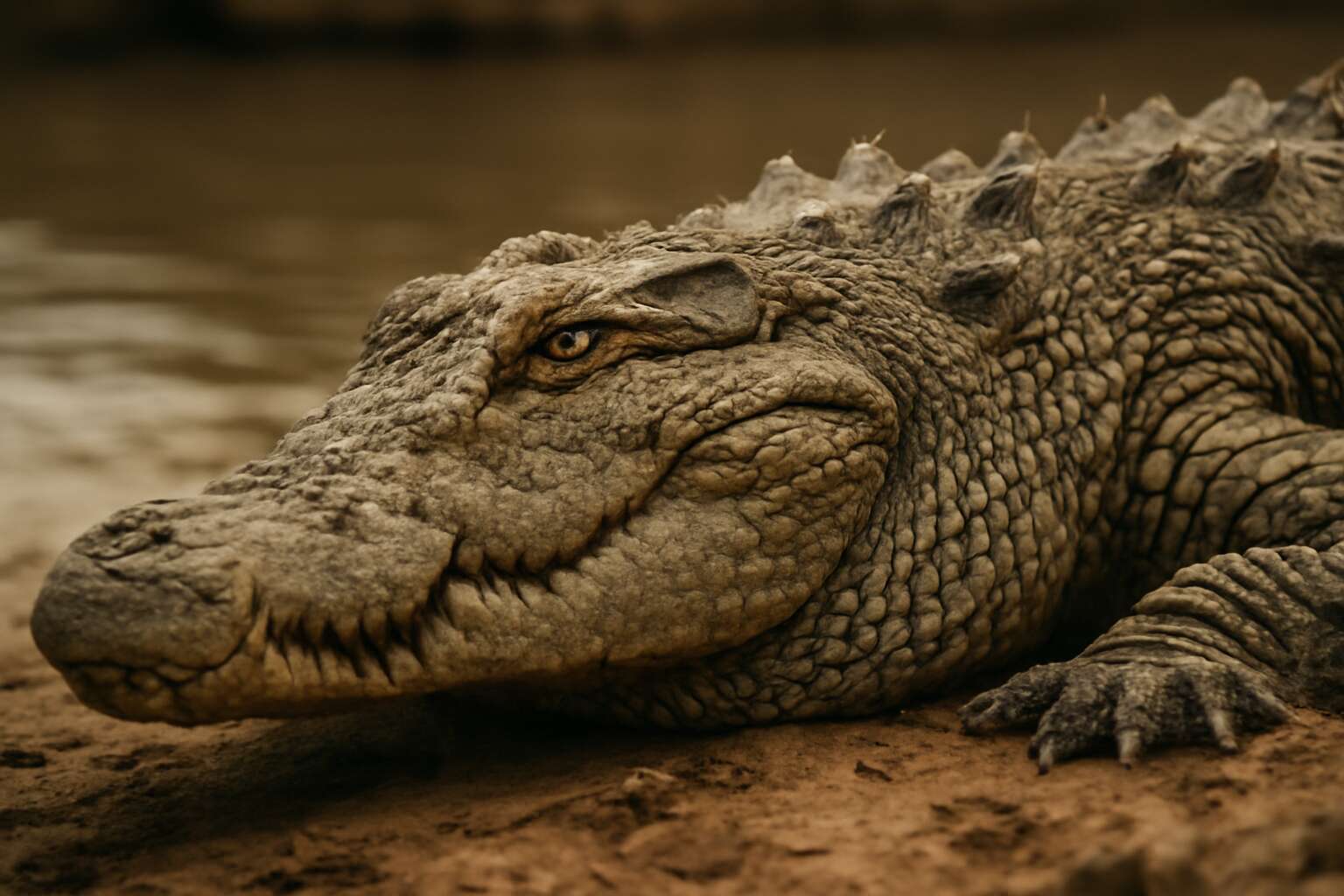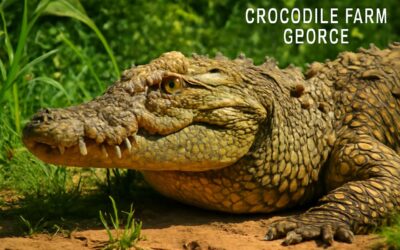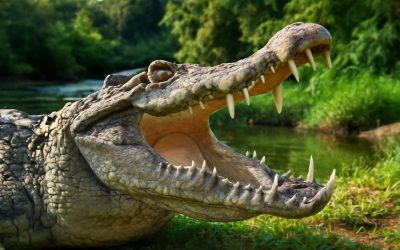Understanding Crocodile Biology and Longevity
Overview of Crocodiles – Physical characteristics, habitats, and behaviors of crocodiles
Many marvel at the apparent resilience of crocodiles, often wondering – are crocodiles truly immortal? These ancient creatures have survived mass extinctions, evolving over 200 million years. To understand whether crocodiles are immortal, it’s essential to delve into their biology and longevity. Their remarkable endurance is partly due to unique physical characteristics that set them apart in the animal kingdom.
Crocodiles possess a robust, armour-like skin that acts as natural protection against predators and environmental hazards. Their powerful jaws and sharp teeth enable them to dominate various habitats, from freshwater rivers to coastal swamps. These habitats are often teeming with threats, yet crocodiles thrive, displaying a behaviourally adaptable nature that has allowed them to persist through countless epochs.
While they are often dubbed “living fossils,” crocodiles are not truly immortal. They do have impressive lifespans, with some individuals reaching up to 70-100 years in the wild. Their slow metabolism and ability to repair tissue damage contribute to their longevity, but they remain vulnerable to disease, habitat loss, and human activity. It’s a testament to their resilience, rather than immortality, that keeps these formidable predators alive across millennia.
Lifespan of Crocodiles – Average age and factors influencing crocodile longevity
Amidst the mysteries of the animal kingdom, one question continues to intrigue: are crocodiles truly immortal? Their resilience over millions of years suggests a biological robustness that borders on the extraordinary. While they are often dubbed “living fossils,” the reality is more nuanced. Crocodiles boast an impressive lifespan, with some individuals living up to 70-100 years in the wild, a testament to their remarkable biology.
Several factors influence how long crocodiles live. Their slow metabolism conserves energy and reduces wear on their bodies, while their ability to repair tissue damage helps them withstand environmental stresses. Additionally, their physical characteristics—such as armour-like skin—offer protection from predators and environmental hazards, further extending their longevity. However, despite their resilience, crocodiles are not immune to threats such as disease, habitat destruction, and human activity, which significantly impact their lifespan.
- Genetic factors that promote tissue regeneration
- Availability of prey and habitat stability
- Impact of environmental conditions such as temperature and water quality
But the real question—are crocodile immortal—remains a matter of perspective. Their ability to endure for decades is extraordinary, yet they are vulnerable to the same vulnerabilities as other living creatures. Their longevity is a marvel of evolution, but not an indication of immortality. Instead, it highlights the delicate balance between resilience and mortality that defines these ancient predators.
Biological Adaptations for Longevity – Unique features that contribute to their long lifespan
When contemplating the resilience of crocodiles, it’s tempting to wonder, are crocodiles truly immortal? Their ancient lineage stretching back over 200 million years hints at a biological marvel that seems almost timeless. Central to their extraordinary longevity are unique biological adaptations that have enabled them to survive mass extinctions and environmental upheavals. These adaptations are not simply survival tactics, but sophisticated mechanisms rooted deep within their biology.
One of the most remarkable features contributing to their longevity is their ability to repair tissue damage efficiently. Crocodiles possess genetic factors that promote tissue regeneration, allowing wounds to heal swiftly and with minimal scarring. This biological trait diminishes the impacts of injuries that might prove fatal to other creatures, giving them a significant edge in their natural environment. Moreover, their slow metabolism conserves energy and reduces wear on their vital organs, enabling them to endure for decades.
In addition to these internal advantages, crocodiles benefit from physical features such as armour-like skin, which offers protection against predators and environmental hazards. Their habitat also plays a vital role; stable prey availability and water quality can influence their lifespan profoundly. This intricate balance between biological resilience and environmental stability underscores why crocodiles often live well beyond half a century in the wild.
The Myth of Crocodile Immortality
Origins of the Immortality Myth – Historical and cultural background
Throughout history, the myth that are crocodile immortal has woven itself into the fabric of human imagination, echoing from ancient tales to modern folklore. These formidable predators, with their ancient lineage stretching back over 200 million years, have long been cloaked in an aura of supernatural endurance. Cultures across the globe have revered crocodiles, often attributing to them divine or eternal qualities, perhaps because their resilience seems almost otherworldly.
In several ancient civilizations, crocodiles symbolised rebirth, immortality, and the cyclical nature of life. The Egyptians, for example, held the crocodile god Sobek in divine reverence, believing that these creatures embodied the eternal cycle of life and death. Such beliefs fostered the myth that crocodiles possess an immortal essence—an idea bolstered by their remarkable biological adaptations that allow them to survive in some of the planet’s most extreme environments.
Interestingly, this myth persists despite scientific evidence confirming that crocodiles, like all living beings, age and eventually perish. But the allure remains; their seemingly ageless presence in the wild fuels speculations—are crocodile immortal? The answer lies somewhere between biological fact and cultural legend, echoing the timeless human fascination with immortality itself.
Crocodile Myths in Different Cultures – Interpretations from ancient civilizations and modern media
The myth that crocodiles are immortal has fascinated cultures for centuries, blurring the lines between fact and folklore. In many ancient societies, these formidable reptiles were seen as symbols of eternal life, their resilience inspiring stories that have persisted through the ages. The question, are crocodiles immortal? Well, it’s more of a myth than a biological truth, but that doesn’t stop the tales from flourishing.
Across different cultures, crocodile myths have taken on diverse interpretations. The Egyptians revered Sobek, the crocodile god, as an emblem of creation, rebirth, and everlasting cycles. Meanwhile, in African and Indigenous Australian traditions, crocodiles often embody primal forces of nature and survival, reinforcing their legendary status. Today, modern media continues to romanticise this myth, with films and documentaries portraying crocodiles as near-immortal beings—almost like prehistoric superheroes lurking in the shadows of the swamp.
Some narratives even list attributes that feed into the myth of crocodile immortality, including their ancient lineage, biological resilience, and ability to survive in extreme environments. But, let’s face it—no creature is truly immortal. Still, the allure persists: the idea that these ancient predators have outlived countless rivals, almost as if they carry the secrets of eternal life in their scaly skin.
Debunking the Myth – Scientific perspective on crocodile aging and mortality
The myth that crocodiles are immortal has persisted for centuries, captivating imaginations and fueling folklore across cultures. But is there any truth to this supernatural claim? Scientific evidence firmly debunks the idea that crocodiles are truly immortal. While these ancient predators possess remarkable resilience, they are not invincible or eternal. In fact, crocodiles, like all creatures, are subject to the natural laws of life and death.
Research shows that crocodiles can live for over 70 years in the wild, with some reaching into their 80s and even 100 in captivity. However, their lifespan is influenced by factors such as habitat quality, diet, and human impact. Despite their impressive longevity, crocodiles inevitably age and face mortality. Their biological adaptations—such as slow metabolism and powerful immune systems—do contribute to their remarkable survival, but they do not grant immortality.
It’s important to recognise that the idea of crocodile immortality is rooted in cultural symbolism and myth, rather than scientific fact. Their resilience may seem supernatural, but it’s a testament to evolutionary adaptation—not immortality. So, the next time someone asks, “Are crocodiles immortal?” remember: these formidable creatures are ancient survivors, but they are not gods of eternity.
Scientific Insights into Crocodile Aging and Healing
Regenerative Abilities – How crocodiles heal wounds and recover from injuries
Scientific investigations into crocodile biology reveal astonishing regenerative capabilities that challenge our understanding of aging. Unlike most creatures, crocodiles possess an extraordinary ability to heal wounds rapidly and with minimal scarring. Researchers are uncovering the biological secrets behind their impressive recovery process, which hints at a form of biological resilience seldom seen in other species.
Recent studies suggest that crocodiles can repair damaged tissue through a complex interplay of cellular regeneration and anti-inflammatory responses. This process involves specialized stem cells that facilitate tissue renewal, allowing wounds to close swiftly and effectively. Intriguingly, some scientists argue that these mechanisms may contribute to the myth of crocodile immortality — a concept rooted in their seemingly ageless resilience.
While it remains scientifically unproven whether crocodiles are truly immortal, their regenerative prowess fuels speculation about the limits of biological aging. Could their unique healing abilities hold the key to unlocking human longevity? For now, the mystery persists, but one thing is clear: crocodiles are far more than ancient relics — they are biological marvels capable of defying conventional aging processes.
Genetic Factors – Potential genetic mechanisms behind their resilience
Scientific insights into crocodile aging and healing reveal a fascinating genetic blueprint that might hold the secret to their remarkable resilience. While the question remains—are crocodiles immortal?—research suggests their genetic makeup plays a crucial role in their ability to recover from injuries and stave off the effects of aging. Key genetic factors appear to enable rapid tissue regeneration and suppress inflammation, both vital in maintaining their health over centuries.
Recent studies point to specific genes associated with cellular repair and anti-inflammatory responses, which are more active in crocodiles than in other species. These genetic mechanisms involve complex pathways that promote tissue renewal and defend against cellular deterioration. The presence of specialised stem cells, for example, allows crocodiles to heal wounds swiftly with minimal scarring, an ability that seems to defy the typical signs of aging.
Scientists are also exploring whether these genetic traits could be harnessed to develop anti-aging therapies for humans. If we understand how crocodiles manage such efficient regeneration, it could unlock potential avenues for extending human longevity. Although it remains unproven whether crocodiles are truly immortal, the genetic factors behind their resilience are undeniably extraordinary and continue to captivate researchers worldwide.
Research Studies – Recent scientific findings on crocodile biology and aging
Recent scientific breakthroughs are shedding light on the mysterious resilience of crocodiles, challenging our understanding of aging and mortality. Researchers have uncovered that these ancient reptiles possess a unique genetic blueprint that fuels their extraordinary ability to heal and regenerate. This insight prompts a tantalising question: are crocodiles immortal? While true immortality remains unproven, their genetic mechanisms suggest they are remarkably equipped to stave off the rigours of time.
Studies reveal that crocodiles have heightened activity in genes responsible for cellular repair and anti-inflammatory responses. These genetic traits enable rapid tissue regeneration, often with minimal scarring, even after severe injuries. Unlike most creatures, crocodiles can recover swiftly from wounds, maintaining their vitality over decades. Interestingly, specialised stem cells play a crucial role in this process, continuously renewing damaged tissues and supporting their enduring health.
Scientists are now exploring whether these genetic secrets could be harnessed to develop innovative anti-aging therapies for humans. If we could replicate the genetic pathways that grant crocodiles such resilience, the dream of extending human longevity might inch closer to reality. Though the question of whether crocodiles are truly immortal remains unanswered, their genetic resilience continues to captivate and inspire researchers worldwide.
Factors That Contribute to Crocodile Longevity
Diet and Environment – Impact of diet, habitat, and ecological factors
While the question “are crocodiles immortal?” might evoke a sense of mythic wonder, the reality is far more nuanced. However, their extraordinary longevity has captivated scientists and enthusiasts alike. One factor that significantly contributes to their extended lifespan is their diet. Crocodiles primarily feast on fish, birds, and small mammals, but they are also opportunistic feeders capable of consuming almost anything available in their environment. Such a versatile diet ensures they receive a broad spectrum of nutrients essential for maintaining cellular health over decades.
Environmental conditions play a crucial role in shaping crocodile longevity. Their habitats—ranging from freshwater rivers to coastal lagoons—offer stable microclimates that support their slow metabolic rate. These ecological factors, combined with their behavioural adaptations, help reduce stress and injury-related mortality. Interestingly, crocodiles also exhibit remarkable regenerative abilities, which contribute to their resilience. In habitats where food is abundant and threats minimal, they can live well beyond the average lifespan, fuelling ongoing debates about whether they are truly immortal or simply incredibly durable creatures.
Predation and Threats – Natural enemies and human-related dangers
Within the murky depths of myth and reality, the question lingers like a shadow: are crocodiles immortal? While science dances around this enigma, the truth reveals itself in the resilience of these ancient predators. Their longevity is not a gift of immortality but a testament to survival’s subtle art—an intricate ballet of biological and ecological mastery.
Yet, even these formidable creatures face relentless predation and human-induced threats. Natural enemies such as large felines and birds of prey may target juveniles, while adult crocodiles often stand unchallenged in their domain. However, it is the encroaching peril of human activity—poaching, habitat destruction, and pollution—that poses the most insidious danger. The delicate balance of their ecosystems teeters under this weight, threatening their extraordinary lifespan.
Despite such hazards, crocodiles exhibit remarkable tenacity. Their thick, armour-like hide and powerful jaws serve as a formidable defence against predators, while their behavioural adaptations enable them to endure in a changing world. Still, the relentless march of human progress reminds us that their survival is far from guaranteed. The question—are crocodiles truly immortal?—remains a captivating mystery, woven into the fabric of nature’s enduring resilience.
Protective Traits – Physical and behavioral traits that reduce mortality risks
While the myth of crocodiles being truly immortal persists in whispers of folklore, their real-world resilience is nothing short of extraordinary. Central to their durability are physical and behavioural traits that significantly reduce mortality risks, allowing them to thrive across millennia. Their armour-like scales act as a formidable shield, deflecting predators and environmental hazards alike, while their powerful tails and muscular build provide swift, decisive escapes from danger.
Furthermore, crocodiles exhibit adaptive behaviours that bolster their longevity. They are expert ambush predators, patiently waiting in the murky depths for the perfect moment to strike, thus reducing the risks associated with hunting. Interestingly, their robust immune systems and remarkable regenerative abilities enable them to recover quickly from injuries, which, in turn, extends their lifespan. Some scientists even suggest that their genetic makeup plays a role in their resilience—possibly holding clues to the enduring mystery of whether crocodiles are truly immortal.
Lessons from Crocodiles for Human Aging and Medicine
Biomedical Research – Studying crocodile biology to inform aging and regenerative medicine
In the quest to understand the enigma of longevity, crocodiles stand as living testaments to resilience, often prompting the question: are crocodile immortal? While they are not truly immortal, their biological adaptations suggest a remarkable resistance to aging processes that typically weaken other species. Studying crocodile biology offers invaluable insights into potential pathways for regenerative medicine and anti-aging therapies.
Researchers are increasingly exploring the genetic factors underpinning crocodiles’ extraordinary durability. These ancient reptiles possess unique features—such as specialised immune responses and unparalleled wound healing capabilities—that could inform human aging research. For example, crocodiles can recover swiftly from injuries that would debilitate other creatures, hinting at mechanisms of cellular regeneration that remain largely elusive in humans.
Some scientific studies propose that certain genes involved in tissue repair and immune regulation could be harnessed to develop novel treatments for age-related decline. In essence, understanding whether crocodiles are truly immortal might be less important than uncovering how their biology defies the typical toll of time. As the boundary between myth and science blurs, the lessons gleaned from crocodiles may one day revolutionise medicine and redefine our approach to aging.
Potential Applications – Biotechnological insights and medical advancements inspired by crocodiles
Although the question “are crocodile immortal?” remains a tantalising mystery, what we truly seek is the secret behind their seemingly ageless resilience. Crocodiles demonstrate an extraordinary capacity for cellular regeneration and immune response, defying the typical signs of aging that plague most creatures. Their biological mechanisms—particularly their wound healing and tissue repair processes—offer a treasure trove of biotechnological insights.
Researchers are dissecting the genetic underpinnings of these extraordinary traits, aiming to translate crocodilian resilience into human medical advancements. For instance, certain genes involved in immune regulation and cellular repair could pave the way for breakthroughs in anti-ageing therapies. The potential applications extend beyond mere curiosity; they could revolutionise regenerative medicine and long-term health management.
In fact, exploring whether crocodiles are truly immortal might be less about the creature itself and more about uncovering the profound biological secrets that allow them to withstand the relentless march of time. As we delve deeper into these ancient reptiles’ biology, we inch closer to unlocking regenerative pathways that could reshape human medicine forever.
Ethical and Conservation Considerations – Balancing scientific exploration with wildlife protection
In the labyrinth of biological mysteries, few questions ignite the imagination quite like whether are crocodile immortal. The allure lies not merely in the myth but in the potential lessons these ancient predators hold for human aging and medicine. Crocodiles, with their capacity for extraordinary cellular regeneration, challenge our understanding of mortality itself. Their resilience hints at mechanisms that could one day be harnessed to extend human healthspan, offering tantalising glimpses into a future where age becomes a mutable trait rather than an inexorable decline.
Yet, this pursuit beckons us to tread carefully through ethical and conservation terrains. The drive to decode the secrets of crocodile longevity must be balanced against the imperative to preserve these majestic creatures in their natural habitats. Overexploitation or careless scientific intrusion risks tipping ecological scales, threatening their survival. It is crucial to recognise that the quest for knowledge does not come at the expense of biodiversity. Responsible research should prioritise sustainable practices, ensuring that the pursuit of biotechnological insights does not undermine the very species that inspire them.
By respecting their ecological niche, scientists can foster a symbiotic relationship—one that honours the integrity of crocodiles while unlocking their biological secrets. Indeed, understanding are crocodile immortal is less about the creature itself and more about uncovering the profound biological pathways that can revolutionise regenerative medicine. As we delve deeper into these ancient reptiles’ biology, we safeguard not only their future but also the potential to transform human health for generations to come.




0 Comments